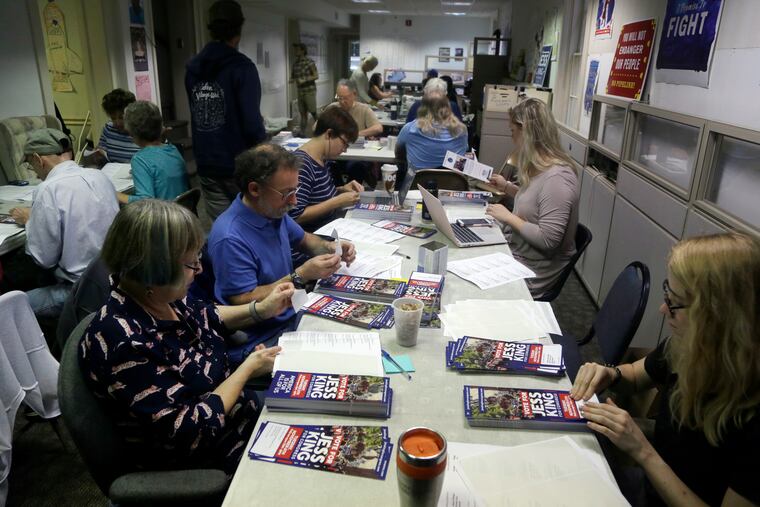Democratic infighting in Pa. battleground Lancaster County: A gift for Trump 2020? | Maria Panaritis
The party chair of this pivotal county is ousted as Dems aim to win back the White House. Not ideal.

I called Amish country a few days ago. It was tricky. I wanted to know why Democrats in Lancaster County had recently forced out the leader of their local party. How in the world could this be anything but bad news for Democrats trying to win the White House through battleground Pennsylvania?
“It’s been brewing for quite some time,” said outgoing chair JoAnn Hentz, 68, a retired educator who spent 10 years as vice chair and, more recently, leader of the party. Hentz was forced to resign by newer members of the party who want to more aggressively court the conservative county’s moderate Democrats and independents.
“There was no compromise,” she said. “It was either leave, or ...”
She added: “It’s new leadership. Let them pull the party together.”
Ouch.
Lancaster County is important to both political parties vying for the White House: Republicans have sought to turn its typically disengaged Amish farmers into Donald Trumpsters. Democrats, fueled by newcomers energized by antipathy toward the president, have been flipping local GOP seats with their own enlivened grassroots maneuvering, even though this is majority-GOP turf just west of the much-ado-blue Philadelphia suburbs.
Blood on the floor in a Democratic skirmish, and making headlines in the local paper the same week as the Iowa caucus vote-counting debacle that showed astounding Democratic Party chaos at the presidential primary level. This doesn’t seem ideal.
Maybe, though, it will work?
High Democratic turnout this year in Lancaster County could send as many as 10,000 new votes (by one operative’s estimate) to the party’s presidential favorite that weren’t there in 2016. Considering Trump won Pennsylvania by only 44,000 votes over Hillary Clinton in 2016, that’s quite a chunk of change.
Already, progressives boosted turnout in an unlikely outsider congressional campaign two years ago by Jess King, even as she lost to incumbent Rep. Lloyd Smucker.
This county is so crucial, historically, that presidential candidates from both parties have visited in election years.
So what went down ahead of Hentz’s resignation in late January?
Apparently, an irreconcilable divide in outlook and strategy between Old Guard and New Guard. The New Guard see this short-term turmoil as necessary to make immediate and long-term strides toward turning this red county purple.
That’s how one of the key figures in the coup, Ismail Smith-Wade-El, explained it to me. The 30-year-old Lancaster City Council president and party vice chair said this fight with the outgoing chair was about embracing new strategies to make leaps forward.
“I’m gonna speak broadly here,” said Smith-Wade-El, a Carnegie Mellon University grad who is in his third year as an elected councilman. “We believe that our former leadership was not maintaining internal and external relationships the way that they should have been maintained, and was not either welcoming the energy or the strategy that this party needs to move forward.”
This type of clash is not unique to Lancaster County’s Democrats. It has been playing out to some extent, also, in Southeastern Pennsylvania since the election of Trump sparked a surge of engagement by newly energized Democratic grassroots foot soldiers.
Those newcomers have helped win elections across the suburbs of Philadelphia since 2017. Many are women, previously uninvolved in the party. They challenged Republicans even for seats that Democrats had not run for previously, making Republicans spend money and break a sweat. They flipped historically Republican Delaware, Chester, and Bucks Counties.
» READ MORE: The Philadelphia suburbs turned blue in a big way. What do Democrats plan to do with their new power?
They have forced Republican retirements at the state legislative level, which is giving Democrats hope of winning the state House of Representatives this fall and having a say in the drawing of legislative district boundaries.
The sweat equity and outrage of these newcomers have rebuilt the Democratic grassroots organizations on the local level, and in most cases establishment leaders have welcomed them. But they have demanded clout.
The party for years leading up to Trump’s Pennsylvania upset over Clinton in 2016 had devoted most of its resources to races for president, governor, and the U.S. Senate. Meanwhile, it became the minority party in both state legislative chambers. On the local level, turnout suffered as the party became zombielike.
In Lancaster County, the newcomers want the party to push with audacious field operations a message of health care and economic equity even in communities that are moderate or conservative. The incoming new party chair, Diane Topakian, is a longtime labor organizer.
Even in deeply conservative towns “like Gap and Elizabethtown," Smith-Wade-El said, they are asking "about what we can be doing to persuade and reach out to voters in more rural parts of the county. We have to be willing to listen to them.”
The other vice chair central to the leadership change, 34-year-old Mary Auker-Endres, agreed when we spoke Friday that maybe this wasn’t the greatest timing for turmoil, given what’s at stake this year. But she says all systems are now go for aggressive electoral gains in November. The Manheim native, for example, is running two Democratic state legislative challengers in heavily Republican districts.
“We all recognized that 2020 is an absolutely must-win year for Democrats," Auker-Endres said. "If we want to see our values reflected for maybe the next decade or more, this is the year we absolutely have to win and we need everybody to be able to work together well.”
If only not for that bloody little clash.